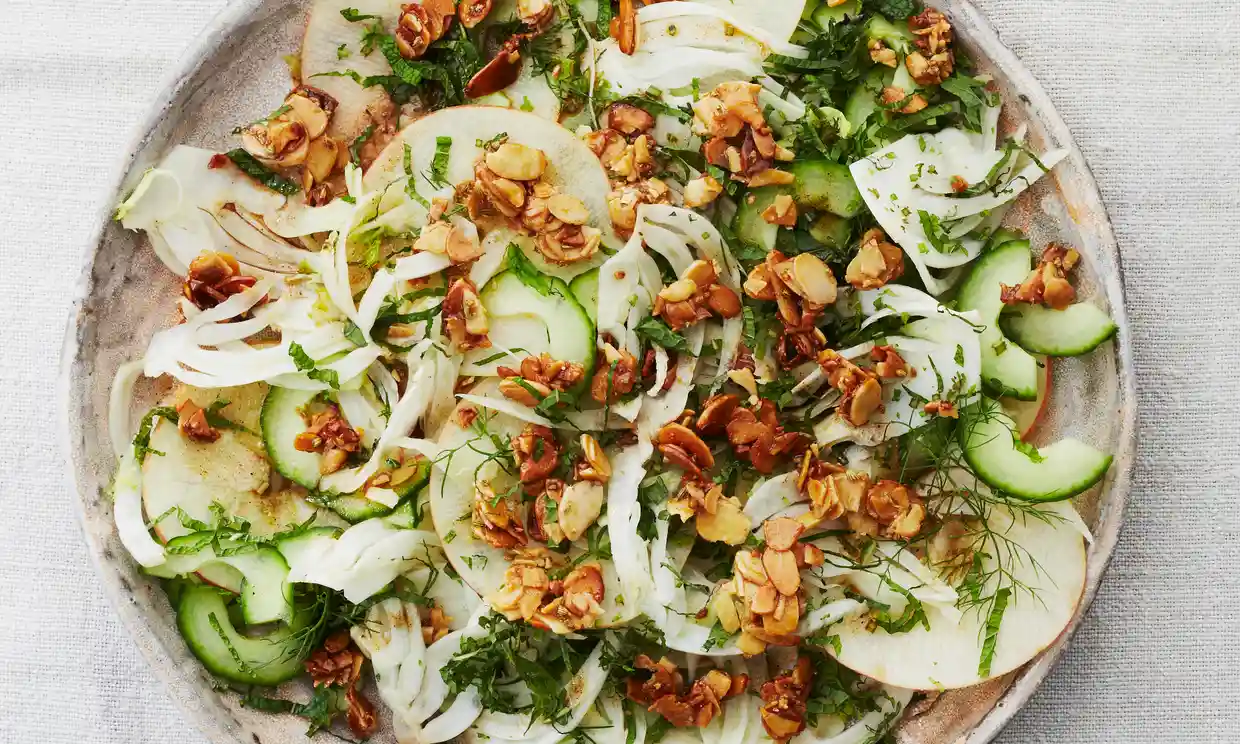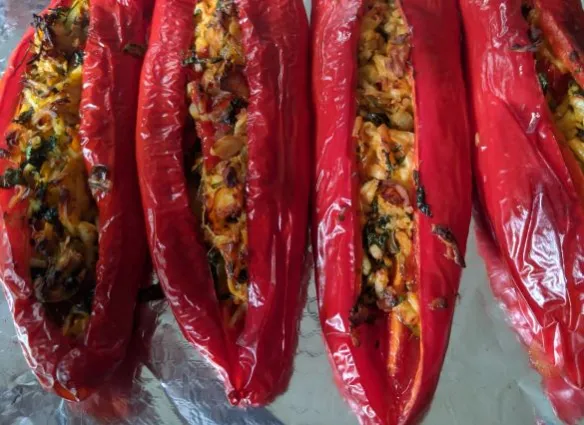A book and a cook
- May 5, 2023
- 7 min read
"I'm sure I'm not the only one who has wondered what an Indian salad could look and taste like." Meera Sodha

I've been flicking through a cookbook written by the young lady shown here - Meera Sodha - who writes a column on vegan food in The Guardian Newsletter and it reminded me how little meat we eat these days. It also reminded me of various vegetarian dishes I have made for my vegetarian granddaughter at family gatherings, almost all of which have turned out to be the most popular offerings of the day. I should also say, a little ashamedly, that the word 'vegan' generally gets my hackles up. Vegetarian I am OK with and part of me would actually like to take that plunge - but not quite, but Vegan to me represents the worst of pretentious do-goodism and just so difficult to get a healthy diet from.

Anyway the thing about Meera Sodha's column is that almost always there is something amazingly tempting on offer. But in spite of all that foreknowledge when I bought this book, and to show how little attention I really pay to what I am buying, I didn't realise it was a book by her until I got it home. I think it was a super, super special somewhere in Doncaster, and so I grabbed it - having flicked through and seen the delicious food on offer. Realising when I got home that it was by Meera Sodha was a complete bonus. That award she won - The Observer's Food Monthly Best New Cookbook was an award voted on by readers, not by 'professional' judges, so that should be an added recommendation.
It's one of those books that has something on almost every page that you might fancy trying one day. Although, in this case, because it is vegetarian, I would probably choose many of them as accompaniments rather than main dishes. Which is not to say that many are not worthy of being main dishes. However, I notice that the recipes I have chosen to represent the book, are mostly not main dishes. More of that later.
So who is she? Well she is the daughter of Indian immigrants from Idi Amin's Uganda whose family heritage is from Gujarat. I have written about Gujarat before when we discovered a Gujarati restaurant nearby. In fact we really ought to go back there because the food was different and delicious. I don't know why we haven't. Gujarat is in the north west of India and is very largely a vegetarian state. Of course vast numbers of Indians are vegetarian, but even more so in Gujarat. Meera Sodha herself was born in England in Lincolnshire where her parents made their home. Her mother was obviously a good cook and adapted Gujarati ways of cooking to the slightly different produce to hand.
When she moved to London:
"I began to notice how my family's approach to cooking was so at odds with how most people thought about and experienced Indian food. While my family gravitated towards the fresh, the vibrant and the seasonal, Indian food in the UK was often heavy, swimming in brown sauce and lacking in variety." Meera Sodha

And so she continued to cook like her mother, eventually marrying an Englishman - I think about the time of writing this book as there is a wedding photograph in a photo collage at the front of the book. Not this one, but - well I liked it. I'm a romantic at heart, and however corny this photo is it does give an impression of the person. Since my book was written she has written her third book East - also critically acclaimed. Her first book was called Made in India, and I think she is now working on a fourth. She has a website - Meera Sodha - of course, where you will find more.
The book begins with 'Ten ways to raise your game in the kitchen' and those ten are:
Taste as you go
Get some balance
Not all chillies are created equal
Always wash your rice
Cook your onions for as long as possible
Embrace failure
Practice makes perfect
Ground spices are fine
Eat with your hands
Share your food
Some are obviously applicable to all kinds of cooking, some not. Some, indeed apply to life in general. I think, for example, that the French do not cook their onions for as long as possible, except for things like onion soup. But yes 'Embrace failure' - as in all things we learn from our mistakes. Well we should, but alas we don't always. Indeed when I think about it human history is a prime example of humankind not learning from its past mistakes.
But I will not philosophise today - to the food and the first chapter on Snacks which begins with these words:
"In India, snacking is not a dirty word. This probably has something to do with the fact that snacks are predominantly freshly made by real people right in front of you. In England, most snacks tend to be processed. Packets of things made by machines, with ingredients called E107 rather than 'chickpeas'.

Although she does admit that this is also changing in India where prepackaged and processed snacks are becoming increasingly available. But the street vendors persist. As she says why would you not buy from somebody who has been cooking his one dish for years and years, from a recipe handed down from his father and maybe his father before him?

So I chose two of her recipes that looked the most tempting to me. The first is Darjeeling momos with chilli sauce. This was probably a mistake as the recipe is not online, although she has a slightly different version simply called Sweet potato momos which has a slightly different filling - the one shown here is carrot and cabbage - which she writes about in the preface to the sweet potato ones:
"I ate my first momos on the streets of Darjeeling, at a stall run by an elderly Nepalese lady of impressive sprightliness. As I waited for a batch of her dumplings to cook, she filled and crimped a dozen or two more with machine-like efficiency. I had low expectations – the filling was a mix of white cabbage and carrot, neither of which are known for their striking personalities – but a torrent of flavour and red-hot chilli heat ripped through the first bite, and I returned to her stall three times in an attempt to dissect the secret of how such a simple little dumpling could have so much charisma."

So maybe the ones in this book were her attempt to replicate them. When I looked online for Darjeeling momos I have to say that most of them were shaped like these professional restaurant ones, and many of them were steamed rather than a combination of frying and steaming. The recipe in her book also includes the dough and its somewhat complicated proving, etc. but as she says you could just use momo wrappers - maybe even wonton wrappers - from a Chinese or local supermarket.

And my second snack? Chickpea pancakes with lime-pickled paneer (Paneer cheela). If it's snack food I'm guessing that the idea would be to have slightly less filling on the pancake before rolling it up and eating it. But it certainly looks hugely tempting like this. And she doesn't mention rolling it up.
Then we come to those salads that she was musing about, because really they don't exist in India. Why?
"With a history of poor-quality water in India, it's no surprise that the country's cuisine has been built around the the idea that everything has to be cooked thoroughly in order to eliminate any potential harmful bacteria. Over centuries, this has manifested itself in the cultural mindset that uncooked food is bad for you."
And that does make sense but surely it would also apply to all those Mediterranean countries with lots of raw vegetable dishes. The Ancient Greeks surely did not have very clean water? Or maybe the Ancient Greeks had constitutions more adapted to the less than pure water. I remember when we rented one house in the Pyrenees, the owners, who lived in a house on the same property mentioned that they drank the water from the stream that ran through the grounds, and that they were acclimatised to it, but did not recommend it for us. But I guess that's an aside. Here are two of her offerings: Fennel and apple chaat with caramelised almonds and Cauliflower and pomegranate chaat (Gohi anaar chaat). The recipe for this is only available online at a website called Homemade Lemoncake and I almost didn't give you the link because it's one of those sites whose owner makes absolutely no reference to where the recipe comes from. Big black mark.
Meera Sodha, on the other hands, gives full credit to the Thali Café in Bristol and its chef Joe Pizer for the creation of this 'main dish' of Sticky mango paneer skewers which I almost made for my vegetarian granddaughter at the last family gathering. And they are definitely on my 'to make' list. As are Paneer stuffed romano peppers the recipe for which is on a website called Hokey Stokey which gives full credit to Meera Sodha. Another one I am planning to make some day.
The last recipe that caught my eye is one called Roast vegetables Madras the recipe for which is on a website called The Veg Isle, again with full credit to the source. All praise to them, but I have to say the photograph they posted of their own attempt was so far from the immaculately styled one in the book that it gave me pause. Is the one in the book unachievable? Full marks for bravery in posting it though. I'm not sure I would have been so bold. I guess it's also a bit of a cheat recipe because really it's just roasted root vegetables, with a sauce on top at the end. Makes you think though doesn't it?
This book has been sitting on my desk waiting for me to 'review' it for a while and so I have not yet experimented with it. Perhaps I'll start with those skewers, although it might entail a trip to the market for the mangoes and red peppers which are exorbitantly expensive in the supermarket. You can get paneer in the ordinary old supermarkets these days though. Or, make your own. Meera Sodha will show you how.













Comments